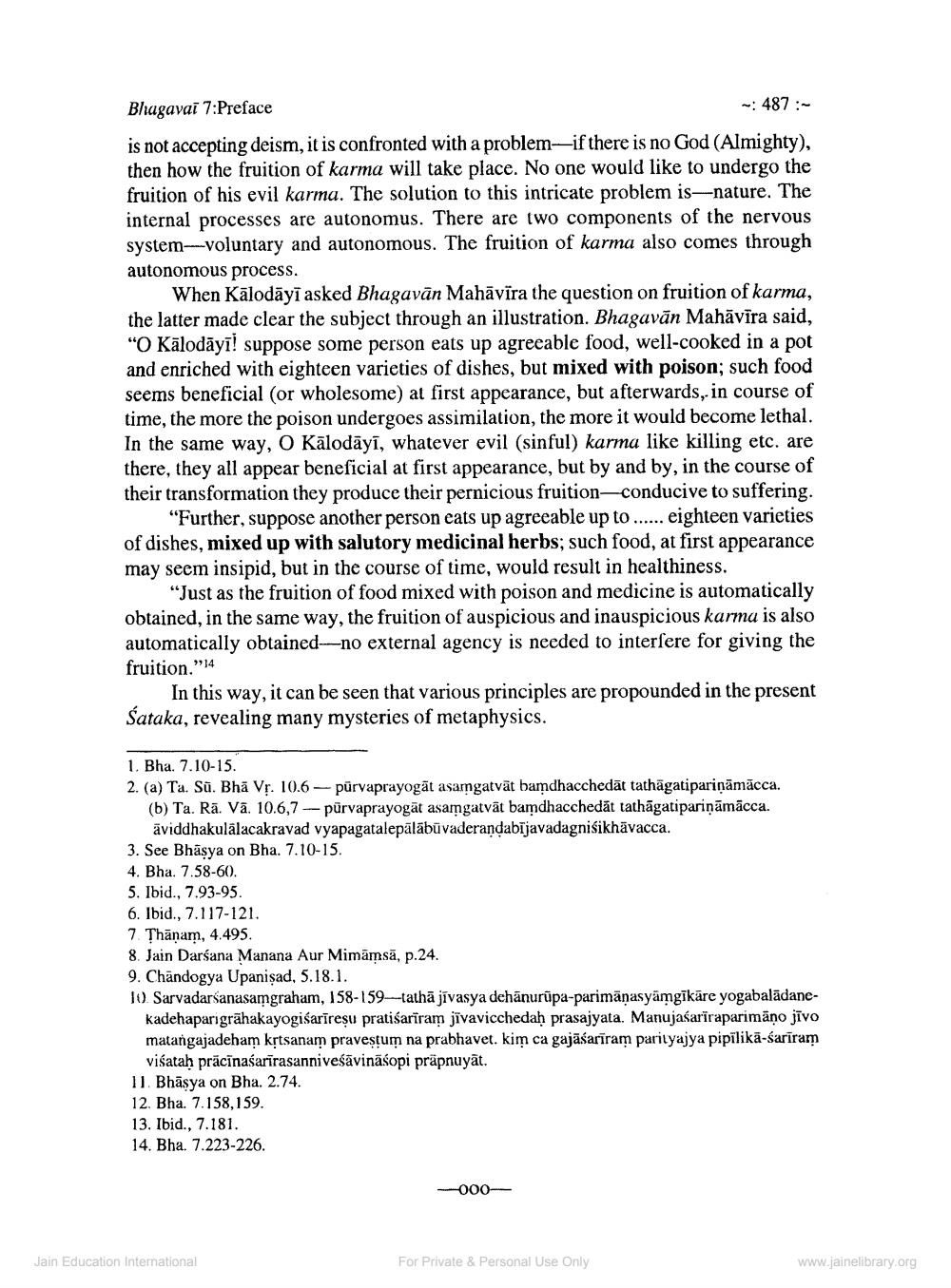________________
Bhagavai 7:Preface
-: 487 :is not accepting deism, it is confronted with a problem—if there is no God (Almighty), then how the fruition of karma will take place. No one would like to undergo the fruition of his evil karma. The solution to this intricate problem is--nature. The internal processes are autonomus. There are two components of the nervous system-voluntary and autonomous. The fruition of karma also comes through autonomous process.
When Kālodāyī asked Bhagavān Mahāvīra the question on fruition of karma, the latter made clear the subject through an illustration. Bhagavān Mahāvīra said, "O Kālodāyī! suppose some person eats up agreeable food, well-cooked in a pot and enriched with eighteen varieties of dishes, but mixed with poison; such food seems beneficial (or wholesome) at first appearance, but afterwards, in course of time, the more the poison undergoes assimilation, the more it would become lethal. In the same way, O Kālodāyī, whatever evil (sinful) karma like killing etc. are there, they all appear beneficial at first appearance, but by and by, in the course of their transformation they produce their pernicious fruition-conducive to suffering.
"Further, suppose another person eats up agreeable up to ...... eighteen varieties of dishes, mixed up with salutory medicinal herbs, such food, at first appearance may seem insipid, but in the course of time, would result in healthiness.
"Just as the fruition of food mixed with poison and medicine is automatically obtained, in the same way, the fruition of auspicious and inauspicious karma is also automatically obtained---no external agency is needed to interfere for giving the fruition."14
In this way, it can be seen that various principles are propounded in the present Sataka, revealing many mysteries of metaphysics.
1. Bha. 7.10-15. 2. (a) Ta. Sū. Bhā Vp. 10.6 - pūrvaprayogāt asamgatvāt bamdhacchedāt tathāgatipariņāmācca.
(b) Ta. Rā. Vā. 10.6,7-purvaprayogāt asamgatvāt bamdhacchedāt tathāgatipariņāmācca.
āviddhakulālacakravad vyapagatalepālābūvaderandabījavadagniśikhāvacca. 3. See Bhāsya on Bha. 7.10-15. 4. Bha. 7.58-60. 5. Ibid., 7.93-95. 6. Ibid., 7.117-121. 7 Thānam, 4.495. 8. Jain Darśana Manana Aur Mimämsä, p.24. 9. Chandogya Upanişad, 5.18.1. 10. Sarvadarśanasamgraham, 158-159-tathā jīvasya dehānurūpa-parimänasyāmgīkāre yogabalādane
kadehaparigrähakayogisarīresu pratiśarīram jīvavicchedah prasajyata. Manujaśarīraparimāņo jīvo matangajadeham krtsanam praveștum na prabhavet. kim ca gajāśariram parityajya pipilika-sarīram
visatah präcīnasarïrasanniveśävinäsopi präpnuyāt. 11. Bhāsya on Bha. 2.74. 12. Bha. 7.158,159. 13. Ibid., 7.181. 14. Bha. 7.223-226.
-000
Jain Education International
For Private & Personal Use Only
www.jainelibrary.org




